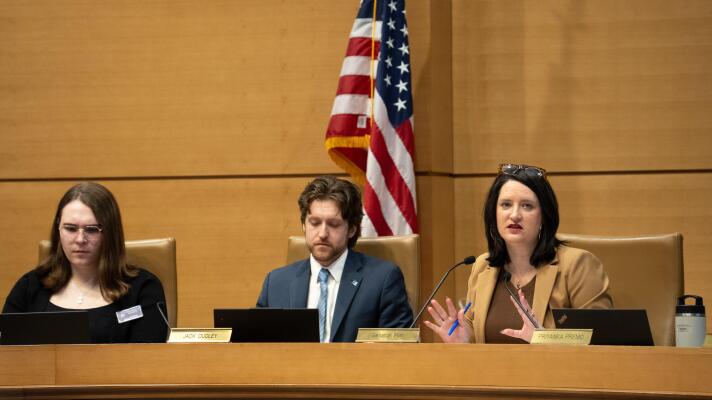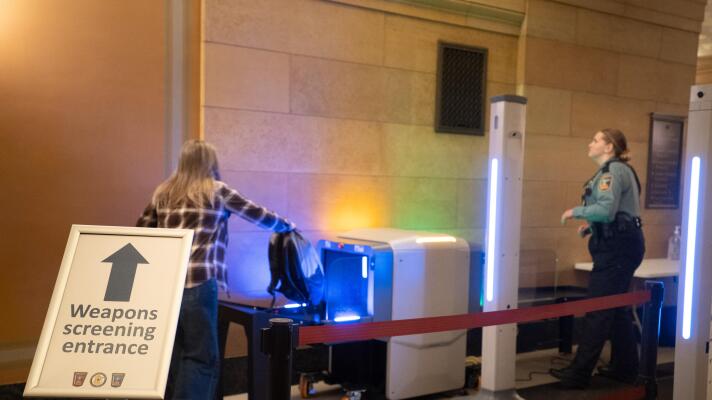The U.S. Department of Justice is asking Minnesota to hand over its voter registration list. Secretary of State Steve Simon is refusing — and now the DOJ is suing Minnesota and five other states that have rejected the Trump administration’s requests for voter rolls.
The DOJ has reached out to more than half the states in recent months for voter lists, Stateline reported. Thursday’s lawsuit targeted six states that have refused to hand over the voter registration data: California, Michigan, Minnesota, New York, New Hampshire and Pennsylvania.
President Donald Trump has long pushed false claims about American elections, including the lie that he won the 2020 election, and the claim that noncitizens are voting en masse. In March, Trump directed U.S. Attorney General Pam Bondi to seek information about suspected election crimes; The DOJ has since shared voter information it collected with the Department of Homeland Security.
The Reformer interviewed Simon, who has held his office since 2015, about the back-and-forth over voter rolls. This interview has been lightly edited for length and clarity.
Can you outline why you are saying ‘no’ to the Department of Justice’s request for Minnesota’s voter registration list?
This starts and ends with the law. We ask ourselves the question, what does the law say about whether or not we can transmit very private and personal information on millions of Minnesotans to the federal government? We’ve looked at the law, and our legal position — which we explained in two letters in painstaking detail — is that the law requires the Department of Justice to show two things, at least. First, why specifically they need this sensitive information, and second, what they’re going to do with this private information.
In other words, who are they going to share it with? For what purposes? What are the safeguards? How will it be stored and kept and transmitted? We believe that state and federal law imposes those requirements. So that’s the short answer, is our read and interpretation of the law is the Department of Justice has not yet done what it would need to do to be entitled to this kind of highly sensitive information on millions of Minnesotans.
I know you sent a letter to the DOJ back in July asking those questions — did you ever hear back from them?
They have never explained with specificity precisely how this information — this very sensitive personal information on millions of people — would aid their inquiry into compliance with federal law. Nor have they shared the other thing we asked about, which is, how are you going to use it? Who will you be sharing it with? How will it be safeguarded?
Even before this lawsuit was filed, our concern was heightened two weeks ago, when there was national reporting that the Department of Homeland Security had said that it covets this information. It has plans to use this information that DOJ is seeking from many states around the country, including Minnesota. That fact, that interest — that stated public interest by another federal agency — is something that the Department of Justice never, ever disclosed to us in any of our correspondence back and forth, which only heightens the concern that the DOJ has not been forthcoming, has not been open, has not been fully transparent about what exactly they plan to do with this sensitive information.
Does Minnesota maintain all of the data that the DOJ was requesting in its voter registration list, like Social Security numbers and driver’s license numbers?
Yes, we do have that information.
Just to back up a little bit — why do states run elections, and why is that important?
The United States Constitution is clear that states are in charge of the time, place and manner of elections. That’s the exact language in the Constitution. The one exception, also in that constitutional provision, is that Congress may step in from time to time and assert authority over some aspects of the election system. The most prominent modern day example is the Voting Rights Act of 1965.
So the Constitution is clear: States are in the driver’s seat, unless and until Congress steps in. It says nothing about anyone else. It says nothing about the President of the United States or the executive branch or anyone else. It’s the states in charge, with guidance and select intervention by Congress. But that’s it. So that’s been our constitutional tradition since the founding, and that’s a system that has worked very well by and large in this country.
You were in office during Trump’s first term. From your point of view as Secretary of State, how have your interactions with the federal government been different during Trump’s second term compared to the first?
What we’re seeing now out of Washington D.C. is not normal, and this is another example of that abnormality. Normally, when the Department of Justice under either or both political parties asks states for elections-related information, it’s very specific. They will ask about one person, or a group of people, or some geographic unit based on some allegation of possible wrongdoing or discrimination. Now we’re seeing huge and sweeping data requests for millions of Minnesotans and tens of millions of Americans in the eight affected states that we have never seen before, for purposes that are murky at best and that have caused a lot of suspicion and alarm across the country — in red states, blue states and purple states. So it’s different this time around. It’s far more sweeping and ambitious and yet less clear.
What are your plans for 2026? Are you running for re-election?
I’ll have an announcement about that in the coming weeks.
Minnesota Reformer is part of States Newsroom, a nonprofit news network supported by grants and a coalition of donors as a 501c(3) public charity. Minnesota Reformer maintains editorial independence. Contact Editor J. Patrick Coolican for questions: info@minnesotareformer.com.
-
Democrats are proposing bills targeting issues including federal officers’ accountability, Minnesotans’ right to privacy and preventing federal agents from entering specific areas.
-
Launch North, the new program from the Arrowhead Area Agency on Aging, will host one-day events in Duluth, Grand Rapids, International Falls and Cloquet.
-
Plus: The AFSCME Local 480 presented a letter of no confidence to the Hibbing School Board Feb. 18, 2026, after months of negotiations without reaching a contract.
-
Sacred Bundle, a nonprofit through the Leech Lake Band of Ojibwe, is expected to close the sale for the downtown site on Feb. 27, 2026.
-
In December 2025, federal prosecutors announced new charges in a widespread Medicaid fraud investigation, leading to new political turmoil about who was at fault and what should be done.
-
Plus: 2142 and Mountain Iron-Buhl select new superintendent; Staples-Motley, Aitkin to host open houses for referendums; MnDOT public transit app expands in Greater Minnesota; and Bemidji girls hockey falls to Edina at state.
-
The former lawmaker's trial is slated to begin March 30, 2026. Eichorn was charged with soliciting a minor in 2025 after a prostitution sting operation in Bloomington, where an undercover officer posed as a 17-year-old online.
-
Aitkin and Staples-Motley school districts are bringing referendums back to the ballots on April 14, 2026, seeking voter approval for construction bonds.
-
The public is invited to fill out an online survey as the state's judicial system works to update its strategic plan, which is updated every two years.
-
Detroit Lakes will compete at state Friday and Saturday, Feb. 20-21, and five Northland athletes from Detroit Lakes and Pillager will also compete individually.





























